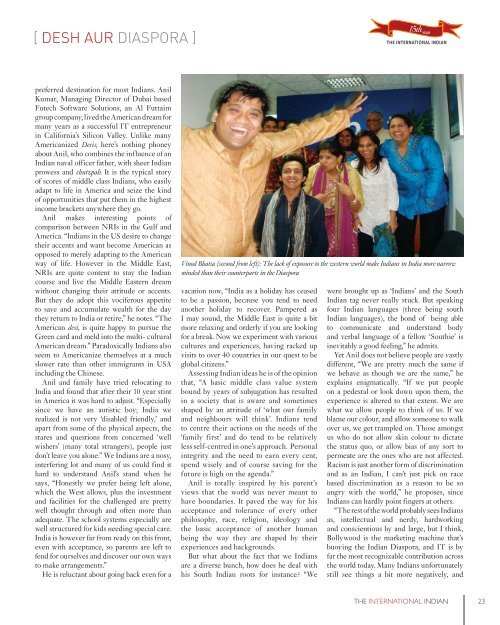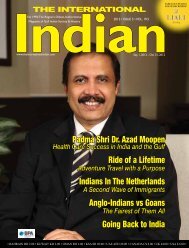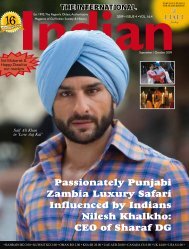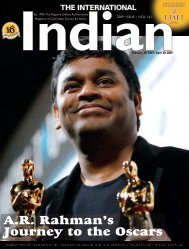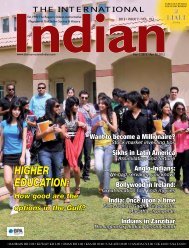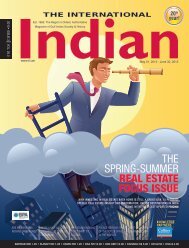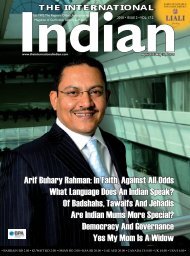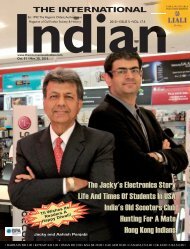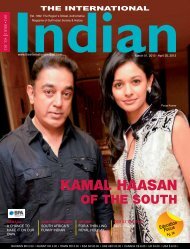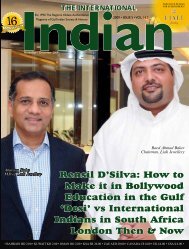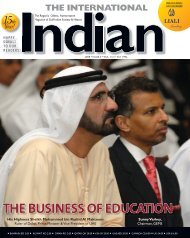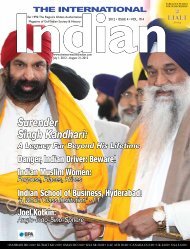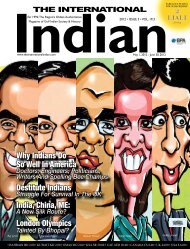THE INTERNATIONAL - International Indian
THE INTERNATIONAL - International Indian
THE INTERNATIONAL - International Indian
You also want an ePaper? Increase the reach of your titles
YUMPU automatically turns print PDFs into web optimized ePapers that Google loves.
[ DEsH Aur DiAsporA ]<br />
preferred destination for most <strong>Indian</strong>s. Anil<br />
Kumar, Managing Director of Dubai based<br />
Futech Software Solutions, an Al Futtaim<br />
group company, lived the American dream for<br />
many years as a successful IT entrepreneur<br />
in California’s Silicon Valley. Unlike many<br />
Americanized Desis, here’s nothing phoney<br />
about Anil, who combines the influence of an<br />
<strong>Indian</strong> naval officer father, with sheer <strong>Indian</strong><br />
prowess and chutzpah. It is the typical story<br />
of scores of middle class <strong>Indian</strong>s, who easily<br />
adapt to life in America and seize the kind<br />
of opportunities that put them in the highest<br />
income brackets anywhere they go.<br />
Anil makes interesting points of<br />
comparison between NRIs in the Gulf and<br />
America. “<strong>Indian</strong>s in the US desire to change<br />
their accents and want become American as<br />
opposed to merely adapting to the American<br />
way of life. However in the Middle East,<br />
NRIs are quite content to stay the <strong>Indian</strong><br />
course and live the Middle Eastern dream<br />
without changing their attitude or accents.<br />
But they do adopt this vociferous appetite<br />
to save and accumulate wealth for the day<br />
they return to India or retire,” he notes. “The<br />
American desi, is quite happy to pursue the<br />
Green card and meld into the multi- cultural<br />
American dream.” Paradoxically <strong>Indian</strong>s also<br />
seem to Americanize themselves at a much<br />
slower rate than other immigrants in USA<br />
including the Chinese.<br />
Anil and family have tried relocating to<br />
India and found that after their 10 year stint<br />
in America it was hard to adjust. “Especially<br />
since we have an autistic boy; India we<br />
realized is not very ‘disabled friendly,’ and<br />
apart from some of the physical aspects, the<br />
stares and questions from concerned ‘well<br />
wishers’ (many total strangers), people just<br />
don’t leave you alone.” We <strong>Indian</strong>s are a nosy,<br />
interfering lot and many of us could find it<br />
hard to understand Anil’s stand when he<br />
says, “Honestly we prefer being left alone,<br />
which the West allows, plus the investment<br />
and facilities for the challenged are pretty<br />
well thought through and often more than<br />
adequate. The school systems especially are<br />
well structured for kids needing special care.<br />
India is however far from ready on this front,<br />
even with acceptance, so parents are left to<br />
fend for ourselves and discover our own ways<br />
to make arrangements.”<br />
He is reluctant about going back even for a<br />
Vinod Bhatia (second from left): The lack of exposure to the western world make <strong>Indian</strong>s in India more narrow<br />
minded than their counterparts in the Diaspora<br />
vacation now, “India as a holiday has ceased<br />
to be a passion, because you tend to need<br />
another holiday to recover. Pampered as<br />
I may sound, the Middle East is quite a bit<br />
more relaxing and orderly if you are looking<br />
for a break. Now we experiment with various<br />
cultures and experiences, having racked up<br />
visits to over 40 countries in our quest to be<br />
global citizens.”<br />
Assessing <strong>Indian</strong> ideas he is of the opinion<br />
that, “A basic middle class value system<br />
bound by years of subjugation has resulted<br />
in a society that is aware and sometimes<br />
shaped by an attitude of ‘what our family<br />
and neighbours will think’. <strong>Indian</strong>s tend<br />
to centre their actions on the needs of the<br />
‘family first’ and do tend to be relatively<br />
less self-centred in one’s approach. Personal<br />
integrity and the need to earn every cent,<br />
spend wisely and of course saving for the<br />
future is high on the agenda.”<br />
Anil is totally inspired by his parent’s<br />
views that the world was never meant to<br />
have boundaries. It paved the way for his<br />
acceptance and tolerance of every other<br />
philosophy, race, religion, ideology and<br />
the basic acceptance of another human<br />
being the way they are shaped by their<br />
experiences and backgrounds.<br />
But what about the fact that we <strong>Indian</strong>s<br />
are a diverse bunch, how does he deal with<br />
his South <strong>Indian</strong> roots for instance? “We<br />
were brought up as ‘<strong>Indian</strong>s’ and the South<br />
<strong>Indian</strong> tag never really stuck. But speaking<br />
four <strong>Indian</strong> languages (three being south<br />
<strong>Indian</strong> languages), the bond of being able<br />
to communicate and understand body<br />
and verbal language of a fellow ‘Southie’ is<br />
inevitably a good feeling,” he admits.<br />
Yet Anil does not believe people are vastly<br />
different, “We are pretty much the same if<br />
we behave as though we are the same,” he<br />
explains enigmatically. “If we put people<br />
on a pedestal or look down upon them, the<br />
experience is altered to that extent. We are<br />
what we allow people to think of us. If we<br />
blame our colour, and allow someone to walk<br />
over us, we get trampled on. Those amongst<br />
us who do not allow skin colour to dictate<br />
the status quo, or allow bias of any sort to<br />
permeate are the ones who are not affected.<br />
Racism is just another form of discrimination<br />
and as an <strong>Indian</strong>, I can’t just pick on race<br />
based discrimination as a reason to be so<br />
angry with the world,” he proposes, since<br />
<strong>Indian</strong>s can hardly point fingers at others.<br />
“The rest of the world probably sees <strong>Indian</strong>s<br />
as, intellectual and nerdy, hardworking<br />
and conscientious by and large, but I think,<br />
Bollywood is the marketing machine that’s<br />
buoying the <strong>Indian</strong> Diaspora, and IT is by<br />
far the most recognizable contribution across<br />
the world today. Many <strong>Indian</strong>s unfortunately<br />
still see things a bit more negatively, and<br />
<strong>THE</strong> <strong>INTERNATIONAL</strong> INDIAN 23


